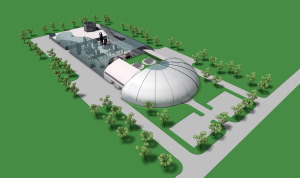
Garbage In, Energy Out
By Dan Pelton
General EnergyPlasco Energy Group's electricity-producing facilities set to transform waste disposal.

Article first appeared in May 2008 issue of Design Engineering
When an announcement comes thatthere’s trash talk going on in Ottawa, the inevitableresponse is “Yeah, so what else is new?” This time,though, it’s not heated banter from the House of Commons.
Rather, the talk centres around privately owned Plasco EnergyGroup Inc. and its potentially game-changing method for dealing with two of the mostpressing social problems of the day: the need for clean, renewableenergy and an efficient, eco-friendly way to dispose of municipal waste.
At its demonstration facility in Ottawa, PlascoEnergy employsa process that holds the promise of converting everyday trash into electricityand saleable by-products with a minimum of environmental impact.
In January 2008, the facility was put through its initial testwhen City of Ottawa trucks dropped off approximately 20 tonnes of municipal solidwaste. Now, as it reaches its full capacity, the facility is convertingeach tonne of waste it receives into 1.4 MWh of electricity, 300 litresof potable water, between 5 and 10 kilograms of commercial salt, 150kilograms of construction aggregate and 5 kilograms ofagricultural-grade sulfur used in fertilizer.
As sci-fi as that may sound, the facility is able to achievethese conversion rates through a unique application of the plasma gasification process, a relatively new technology that vaporizes waste to create a syntheticfuel used to power generators.
“One of the big advantages PlascoEnergy has over anything else I’ve done is that there is a world urgency about climate change,” sayscompany president and CEO Rod Bryden. “Ours is the onlysystem in the world that has been able to receive random municipalwaste, which is highly variable in its content, and produce gas that isconsistent in its energy content and is clean.”
It’s a big claim, but Bryden—best known asthe owner of the Ottawa Senators hockey team—is no stranger to high tech or theeco-business. Initially, he made his fortune as the entrepreneurialforce behind Systemhouse, a computer systems integrator. Later, hebecame one of the pioneers of paper recycling in Canada, when onlyabout 15 percent of the packaging materials in Canada were recycled.
